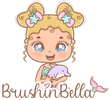A Comprehensive Guide from the Experts at BrushinBella
Potty training is an important milestone in a child's development. It is a process that requires patience, consistency, and expert guidance. In this comprehensive guide, the experts at BrushinBella will provide you with valuable insights and tips to make the potty training journey a smooth and successful one.
When is the right time to start potty training?
Every child is different, but most children are ready to start potty training between the ages of 2 and 3. Look for signs of readiness such as showing interest in the bathroom, staying dry for longer periods, and being able to follow simple instructions.
Creating a potty training routine
Establishing a consistent routine is key to successful potty training. Encourage your child to sit on the potty at regular intervals, such as after meals or before bedtime. Make sure to praise and reward your child for their efforts, even if they don't succeed right away.
Choosing the right potty training seat
When it comes to potty training seats, there are several options to choose from. Some children prefer a standalone potty chair, while others feel more comfortable using a seat that fits on top of the regular toilet. Let your child be involved in the decision-making process to ensure their comfort and cooperation.
Teaching proper hygiene
Good hygiene habits are essential during the potty training process. Teach your child to wash their hands thoroughly with soap and water after using the potty. Make it a fun and engaging activity by singing a handwashing song or using colorful soap.

Dealing with accidents
Accidents are a normal part of the potty training journey. Stay calm and reassure your child that accidents happen. Avoid punishment or shaming, as this can create negative associations with using the potty. Instead, focus on positive reinforcement and encourage your child to try again next time.
Nighttime potty training
Once your child has mastered daytime potty training, you can start working on nighttime training. Limit fluid intake before bedtime and encourage your child to use the potty before going to sleep. Be patient, as nighttime dryness may take longer to achieve.
Consistency is key
Consistency is crucial throughout the potty training process. Stick to the routine, offer praise and rewards for successful attempts, and be patient with setbacks. Remember that every child is unique, and they will progress at their own pace.
Seeking professional help
If you're facing challenges or your child is not making progress with potty training, don't hesitate to seek professional help. Pediatricians and child development experts can provide guidance and support to ensure a successful potty training experience.
In conclusion, potty training is a significant milestone in a child's life. With the right approach, patience, and expert guidance, you can help your child navigate this important transition. Remember to celebrate every small success and provide a supportive and encouraging environment. Happy potty training!
